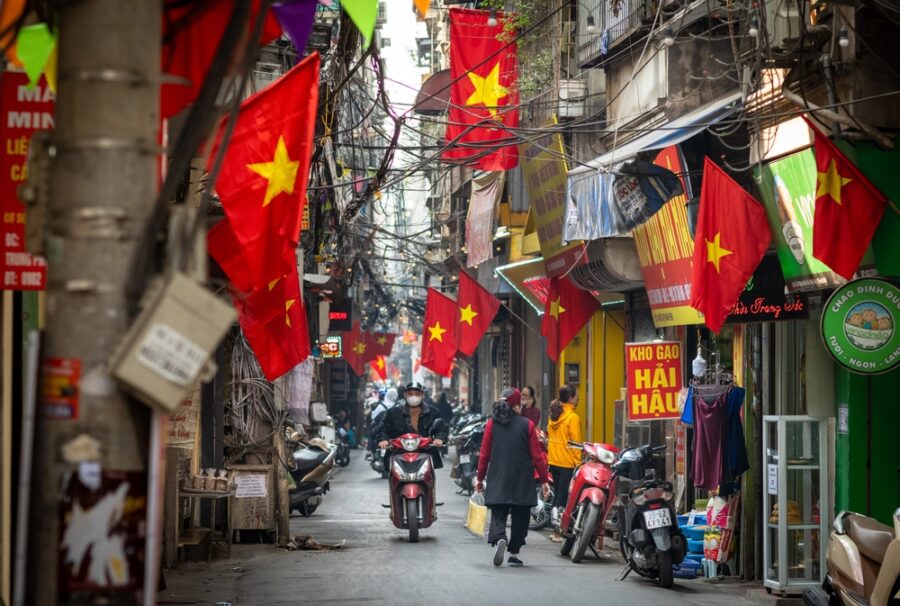Vietnam to launch international football betting pilot

Vietnam’s Ministry of Finance has released a draft decree that proposes a five-year pilot program for international football betting, alongside horse and greyhound racing.
Only one operator would be licensed to run football betting activities. At the end of the pilot, the government will assess the results to decide whether to legalize football betting.
The chosen operator will need to provide a minimum capital of VND1 trillion (US$38 million)1 VND = 0.0000 USD
2025-09-29Powered by CMG CurrenShift.
Foreign ownership also will be capped at 49%, and foreign investors will not be able to hold a larger stake than domestic shareholders. Shareholders will not be allowed to transfer their stakes.
The chosen operator will be required to contribute at least 10% of net betting revenue, after payouts, to the state budget in addition to standard taxes.
Minimum bets will be set at VND10,000 (US$0.38)1 VND = 0.0000 USD
2025-09-29Powered by CMG CurrenShift, with a daily betting limit of VND10 million (US$378)1 VND = 0.0000 USD
2025-09-29Powered by CMG CurrenShift per player.
According to an analysis by British gambling operator Ladbrokes, Vietnam’s betting market, formal and informal, is estimated to account for up to 5% of the national gross domestic product.
If the five-year trial proves successful, some in the Vietnamese government hope it will lead to the regulation of a primarily underground sector and generate new revenue streams.
While lawmakers look to legalize some forms of sports betting in Vietnam, Vietnamese authorities jailed 43 people last week for running an igaming ring.
Charlotte Capewell brings her passion for storytelling and expertise in writing, researching, and the gambling industry to every article she writes. Her specialties include the US gambling industry, regulator legislation, igaming, and more.
Verticals:
Sectors:
Topics:
Dig Deeper
The Backstory
Why Vietnam is edging into regulated football betting
Vietnamese officials are tiptoeing into legal sports wagering with a tightly controlled, five-year pilot focused on international football and a single licensed operator. A draft decree from the Ministry of Finance would cap foreign ownership at 49%, require at least VND1 trillion in capital, impose a minimum bet of VND10,000 and set a daily betting limit of VND10 million per player. The operator would also contribute at least 10% of net betting revenue, after payouts, to the state budget on top of standard taxes. The proposal, outlined in detail in the ministry’s plan to launch an international football betting pilot, aims to test whether a narrow license can migrate activity from the shadows into a supervised market and generate steady tax income. If the trial succeeds, the government could expand legal wagering after the assessment period ends. The pilot’s design signals regulators want scale and accountability from day one and minimal exposure to external control.
The timing is deliberate. Vietnam’s policymakers have watched online betting proliferate through offshore sites and crypto rails while enforcement whack-a-mole has grown more complex and costly. Bringing a sliver of that demand onshore under strict limits is a pragmatic step that tries to balance public revenue, integrity controls and social risks. It is also a political test: one licensee means regulators can keep oversight tight, but it also concentrates responsibility and reputational risk in a single entity.
A crackdown that set the stage
The pilot follows a run of high-profile enforcement actions that clarified both the scale of illegal play and the methods used to avoid detection. Courts in Ho Chi Minh City recently jailed 43 people for operating a crypto-linked gambling network that ran from early 2020 to late 2021 and moved about VND88,000 billion through two platforms connected to live casino content. According to the verdict, funds were converted into tokens such as USDT and Ethereum, then cycled through e-wallets and laundered via real estate and luxury cars. The case, detailed in coverage of Vietnam jailing 43 people for a VND88,000 billion online gambling ring, highlighted how social media recruitment, tokenization of fiat and cross-border payment tools have reshaped illicit betting at speed.
Police also took down what they described as the largest money-laundering operation uncovered in Da Nang, alleging an international ring laundered about US$1.2 billion between 2022 and 2024 through more than 187 registered businesses and 600 bank accounts tied to fraud and online casinos. The account of the Vietnam police bust of a US$1.2 billion illegal gaming operation underscored an enforcement pivot toward financial flows, not just website takedowns. These cases, paired with the life sentence handed down in October to a real estate magnate for bank embezzlement, have reinforced the government’s appetite for visible wins against financial crime. A controlled betting market offers a complementary lever: shrink the illicit base by channeling demand into a monitored product.
Sizing the market and the policy calculus
Analysts estimate that betting, legal and illegal, may account for up to 5% of Vietnam’s gross domestic product, according to a British operator cited in the ministry’s draft. That is a striking figure for a market where sports wagering is still largely underground. The pilot’s structure attempts to test three hypotheses. First, that a legal outlet with daily limits can curb the appeal of offshore books for casual bettors. Second, that a single licensed node simplifies oversight and data collection, letting regulators assess harm, integrity risks and tax potential with fewer variables. Third, that ring-fenced rules on ownership and capital reduce capture risks and ensure the operator can fund compliance and technology.
The trade-offs are real. One operator means less competition on price and product and could leave innovation to illicit sites. A hard daily cap could push heavier users back to unregulated channels. And the state’s requirement for an extra 10% contribution on net revenue, while politically defensible, will test margins and investment appetite, especially if compliance costs run high. Still, as a pilot, the bar is not perfection. It is demonstrable movement of volume into traceable, taxable channels while minimizing social harms.
Lessons from Brazil’s rapid buildout
Elsewhere, Brazil is stress-testing a different model: a broad market launch backed by integrity and payments coordination. The International Betting Integrity Association has created a Payment Provider Forum in Brazil with institutions including Bazk, Z.ro Bank, Onekey Payments, OKTO, VPag and Pay4Fun to fight financial fraud tied to competition manipulation. The initiative, described in IBIA’s launch of a Brazil Payment Provider Forum, gives members access to global integrity monitoring and data intelligence and pushes for consistent rules, responsible gambling and high conduct standards. The premise is that collaboration across operators, banks and regulators can starve bad actors of payment pathways and surface suspicious patterns faster.
Operators, meanwhile, are racing to localize content and build brand affinity. Inspired Entertainment’s tie-up with Kaizen Gaming brings V-Play Football Brazil to Betano with official Brasileirão Betano branding, logos and visual themes. The partnership, covered in Inspired’s launch of V-Play Football in Brazil with Betano, shows how virtual sports can extend engagement between live events and harness league IP to increase realism. For Vietnam, where the pilot focuses on international football but will be judged on channelization and integrity, Brazil’s experience suggests two priorities: hardening payment rails against fraud and aligning content with local preferences without compromising controls.
Integrity as a prerequisite, not an afterthought
The viability of any regulated market hinges on bettors believing events are fair and authorities swiftly catching anomalies. The International Betting Integrity Association’s network, which monitors an annual handle of about US$300 billion across 70+ companies and 140 brands, flagged 219 suspicious betting alerts in an annual report released in February 2024 that led to sanctions against 17 teams, players and officials. The association continues to expand its footprint, with Hard Rock Digital joining to share integrity data from its Hard Rock Bet platform. That move, detailed in Hard Rock Digital joining the International Betting Integrity Association, adds another U.S. operator to a cooperative model that Vietnam could tap, whether through data-sharing protocols, alert triage or best practices for operator reporting.
Even a single-license framework will need a robust integrity stack: bet-level monitoring, customer due diligence, transaction screening and clear escalation paths to regulators and law enforcement. Brazil’s payment forum shows one template for linking financial institutions with operators. Vietnam’s recent investigations show why that linkage matters: illicit networks are agile, and their edge often lies in payments, not product.
What to watch as the pilot takes shape
Vietnam’s decree will draw interest from global firms, but the ownership cap and requirement that foreign investors not hold a larger stake than domestic shareholders narrow the eligible field. The ban on stake transfers may deter financial buyers and favor strategic investors who can commit capital and compliance resources for the full term. Technology choices will be telling. Expect regulators to favor platforms with strong player protection, real-time risk scoring and audit trails that satisfy both financial crime and sports integrity needs.
The biggest question is channelization. Can one licensed operator, with daily betting limits and an extra 10% contribution to the state budget, attract enough casual bettors away from offshore sites to move the needle on tax receipts and harm reduction? The answer will shape whether the government broadens the market after the five-year review or doubles down on a single-license approach. Enforcement will remain the backstop. As seen in the takedown of the US$1.2 billion laundering ring in Da Nang and the sentencing of 43 defendants in Ho Chi Minh City, authorities are prepared to pair regulation with prosecution. The pilot’s success will hinge on making the legal path easier, safer and sufficiently attractive while keeping the illicit path costly and risky.









